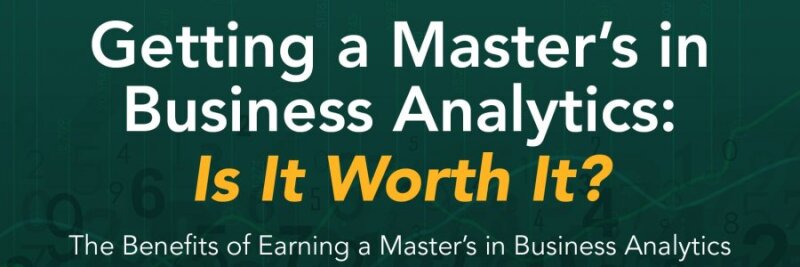Is a Master of Science in Business Analytics (MSBA) worth it? If you’re interested in pursuing a high-level career in data science and strategic decision-making for business, the answer is yes. All business is increasingly data-driven, and the job of capturing and making sense of that data is largely the domain of business analytics. The Online MSBA program through the Raymond A. Mason School of Business at William & Mary is designed to equip graduates with high-level technical proficiency and in-depth strategic business knowledge, developing the next generation of business leaders.
This blog post will explore what you can do with a business analytics degree and why a master’s degree in this field is worth it.
The Growing Demand for Business Analytics Professionals
Business analytics is an all-encompassing term for the collection, storage and analysis of ever-increasing amounts of data that drives a large amount of decision-making in business. It’s a combination of data science and management consulting, including rapidly emerging fields like AI and relatively advanced areas of collaboration between technology and business, such as the use of big data for predictive analytics and forecasting.
The demand for business analytics degrees is driven by two complementary dynamics: the rise of specialty data needs within specific industry verticals and the increasing use of data to guide business decisions across multiple core business functions. As such, business analytics is a key part of the way businesses in healthcare, finance, e-commerce and retail operate. It’s also critical to marketing, finance and operations across all industries.1
Long-Term Career Growth With an MSBA
An advanced degree like the Online MSBA from William & Mary is designed to equip you with both the technical skills required to excel in business analytics, as well as the strategic know-how and experience necessary to prepare for future leadership roles.
Career advancement remains one of the most important aspirations—and achievements—among our graduates, as illustrated by the 82% of recent William & Mary Online MSBA graduates who reported they received or anticipated a promotion within six months of graduation.
Whether your objective is upskilling, finding a new skillset or gaining a qualification to advance to a more senior position, an MSBA is intended to help drive long-term career growth.
How Much Does a Master’s in Business Analytics Make?
According to Indeed, average salaries for analyst roles in business analytics in the United States are around $95,000 per year.2 That average includes a potentially broad range of positions, such as operations research analysts (average salary is $53,477 per year) and data scientists (average salary is $119,380 per year).1
William & Mary’s Online MSBA graduates were found to have an average salary of $120,738 in a recent survey.
Perhaps most importantly, the long-term employment prospects for business analytics specialists look promising. A recent U.S. News & World Report survey ranked several roles that might recruit business analytics graduates: financial analyst, management analyst, market research analyst and business operations manager. These are among the top 10 Best Business Jobs in the US in 2025.3
Is a Business Analytics Degree Worth It for Career Changers?
Is a business analytics degree worth it for those who want to change careers? The MSBA might be of greatest value to career changers, since it offers specific technical knowledge required to break into the analytics field. Core courses include how to develop and use databases and data warehouses, and business modeling using the Python programming language.
This technical knowledge is also important in developing the next generation of managers, who will be better placed to use data for decision-making if they understand how it is generated. Furthermore, analysts and managers who understand the strengths and limitations of today’s technologies will help to shape the business analytics of the future. As the increasing use of AI across various business functions demonstrates, the jobs of tomorrow look increasingly likely to revolve around understanding and managing automated processes—a concept the Online MSBA covers extensively.
What You Learn in a Business Analytics Master’s Program
At William & Mary, the aim of our business analytics programs is not just to teach students technical fundamentals like Python and SQL, but also to equip our graduates with the skills to apply their technical proficiency to decision-making models. The curriculum blends technical skills, business knowledge and strategic thinking.
Our Online MSBA develops business leaders who can turn raw data into actionable insights that drive smarter business decisions. As the program Faculty Director, Professor Guillermo Rodríguez-Abitia, tells students, “It doesn’t matter that you’re the best model maker and you create all these models that will give you very good insights in terms of what the data is telling you. If you cannot communicate that in plain English, in business language to the business leaders, then your work is useless.” Our graduates know how to translate data into strategy, making them a valuable bridge between technical teams and executive decision-makers.
How To Know if a Master’s in Business Analytics Is Worth It for You
To determine if William & Mary’s Online MSBA is right for you, take a data-driven approach. Evaluate the necessary investment of time and budget into obtaining the degree against the expected return in terms of new skills and earning potential. You can complete your degree in as little as 16 months, and along the way, you’ll earn qualifications that will immediately put your resume ahead of the rest. You’ll also have networking opportunities with students and professionals who have experience in diverse industries and roles.
Explore our admissions requirements and get started on your application today. Want to find out more about how an Online MSBA can advance your career? Schedule a call with one of our helpful admissions outreach advisors.
- Retrieved on September 4, 2025, from indeed.com/career-advice/finding-a-job/what-do-with-business-analytics-degree
- Retrieved on September 4, 2025, from indeed.com/career/business-analytics-analyst/salaries
- Retrieved on September 4, 2025, from money.usnews.com/careers/best-jobs/rankings/best-business-jobs

